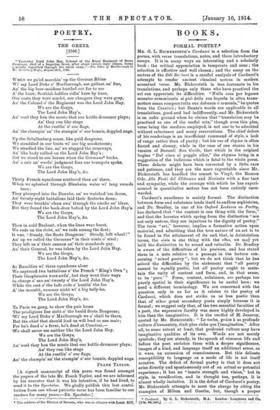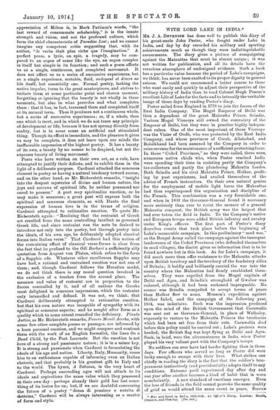BOOKS.
FORMAL POETRY"
Mkt G. L. BICKERSTETIL'S Carducci is a selection from the poems, with verse translations, notes, and three introductory essays. It is in many ways an interesting and a scholarly book the critical appreciation is temperate and sane ; the selection is effective and well chosen; and the essay on the metres of the Odi Embari is a careful analysis of Garducces attempts to render ancient classical metres in modern accentual verse. Mr. Bickersteth is less fortunate in his translations, and perhaps only those who have practised the art can appreciate its difficulties. "Nulls cosy per• legame musaico armonizzata si pub della sun loquela in altra trans- mutare senza rompere tutta sun dolcezza e armonia," he quotes from the Convivio ; but DanM's words are applicable to all translations, good and bad indifferently, and Mr. Bickersteth is on safer ground when he claims that " translation may be practised as one of the useful arts," though even this plea, verse being the medium employed, is not one to be admitted without reluctance and many reservations. The chief defect of his renderings is an insufficient command of style, a lack of range rather than of purity ; but his use of rhyme is often forced and clumsy, while in the case of one stanza in his version of Davanti San Guido, that which in the original begins "Dal elms al poggio allor," the rhymes bring in a suggestion of the ludicrous which is fatal to the whole poem. These defects might have been corrected by a little care and patience, and they are the more regrettable since Mr. Bickersteth has handled the sonnet to Virgil, the Roman Ode, Alla Fonti del CW14111410 and Nevicata with a fine tact and sympathy, while the courage with which he has experi- mented in quantitative metres has not been entirely unre- warded.
Carducci'a excellence is mainly formal. The distinction between form and substance lends itself to endless sophistries, and Dr. Bradley, in one of his Oxford Lectures on Poetry, has declared that "the content is one thing with the form," and that the heresies which spring from the distinction "are not only untrue, they are injurious to the dignity of poetry." The term "art," however, implies a formative action upon material, and admitting that the true nature of an art is to be found in the attainment of its end, that, in Aristotelian terms, the aorta is oite thing with the .160s, we mai yet hold the distinction to be sound and valuable. Dr. Bradley is aware of the difficulties of his position, and has stated them in a note relative to a passage in the lecture con- cerning "mixed poetry"; but we do not think that he has solved the difficulties by the statement that "all poetry cannot be equally poetic, but all poetry ought to main- tain the unity of content and form, and, in that sense, to be ' pure.' " Form, content, substance, are perhaps too purely spatial in their significance to be useful here: we need a different terminology. We are concerned with the question only in so far as it relates to the poetry of Carlucci, which does not strike us as less poetic than that of other great secondary poets simply because it is formal; we suggest only that, of the two essential faculties of a poet, the expressive faculty was more highly developed in him than the imaginative. It is the verdict of IL Jeanroy, quoted by Mr. Bickersteth " Le verbs, grdce a aa profonde culture d'humaniate, dtait plus riche que 1:imagination." After all, to some extent at least, that profound culture may have imaginative qualities of its own. Words are not merely symbols; they are already, in the speech of common life and before the poet enriches them with a deeper significance, images of a kind, and language itself an additional sense, as it were, an extension of consciousness. But this delicate susceptibility to language as a mode of life is not itself creative. The defect of formal poetry is that it does not arise directly and spontaneously out of an actual or potential experience ; it has no "innate strength and vision," but in style, in versification, and in thought too, perhaps, it is almost wholly imitative. It is the defect of Carducci's poetry.
Bickersteth attempts to meet the charge by citing the examples of Milton and Goethe, but, though a proper
• Sardure. By G. L. Biekeaateth M.A. London: Loismana and ibis. 84..netj L.. . :
appreciation of Milton is, in Mark Pattison'a words, "the last reward of consummate scholarship," it is the innate strength and vision, and not the profound culture, which form the chief characteristic of Paradise Lost ; and we cannot imagine any competent critic suggesting that, with its author, "le verbs keit plus riche qua l'imagination." A perfect poem, a lyric, an epic, a tragedy, may be com- pared to an organ of sense like the eye, an organ complex in itself but simple in its function; and such a poem affects us as a single, continuous, and completed movement. It does not affect us as a series of successive experiences, but as a single experience, mutable, fluid, ondoyant et divers as life itself, but essentially one. Formal poetry, lacking the native impulse, turns to the great masterpieces, and strives to imitate them, at some particular point and chosen moment, forgetting or ignoring that the beauty is not wholly in these moments, but also in what precedes and what completes them that it has, in fact, traversed them and completed itself at its natural term. Thus it produces not a continuous whole, but a series of successive experiences; or, if a whole, then one which is inert, and in which we do not trace any principle of development or life, because it has nob sprung directly from reality, but is in some sense an artificial and stimulated thing. Though its effect is immediate, and the pleasure it gives us may be complete, it does not leave upon our minds the ineffaceable impression of the highest poetry. It has a beauty of its own, a beauty by no means to be despised, but not the supreme beauty of living movement.
Poets who have written on their own art, as a rule, have attempted to justify their defects, and to exhibit them in the light of a deliberate purpose. Carducci attacked the sensuous element in poetry as having a natural tendency toward excess; and on the other hand, as Mr. Biekersteth remarks, " insight into the deepest mysteries of divine and human nature, the joys and sorrows of spiritual life, he neither possessed nor eared to possess." A poet may spiritualize emotion, or he may make it sensuous; a great poet will express both the spiritual and sensuous elements, as with Dante the final expression of human love is in the terms of religion. Carducci attempted to rationalize emotion. To quote Mr. Bickersteth again: "Realizing that the restraint of Greek art resulted from the same controlling intellect as governed Greek life, and since restraint was the note he desired to introduce not only into the poetry, but through poetry into the ideals, of his own age, he deliberately adopted classical forms into Italian verse." That Cardneci had this notion of the restraining effect of classical verse-forms is clear from the fact that he prefixed to the Odi Barbari a sufficiently silly quotation from August von Platen, which refers to the form of a Sapphic ode. Whatever other excellences Sappho may have had, a rational and restrained emotion was not one of them ; and, though Carducci follows the Horatian model, we do not think there is any moral question involved in the exclusion of a trochee from the second place. The measure and value of restraint are in proportion to the forces controlled by it, and of all nations the Greeks most delighted in sensuous impressions, which the restraint only intensified and defined. It was not, we think, that Carducci deliberately attempted to rationalize emotion, but that his own nature was incapable of sympathy with its spiritual or sensuous aspects; and he sought after form as a quality which to some extent remedied the deficiency. Picnic. Antics, as Mr. Biekersteth remarks, Funcre Mersa Acerb°, with some few other complete poems or passages, are informed by a keen personal emotion, and we might compare and contrast them with the work of an English formalist, the lines On a Dead Child, by the Poet Laureate. But the emotion is not here of a strong and passionate nature; it is in a minor key. It is strong and passionate when Carducci is formulating the ideals of his age and nation. Liberty, Italy, Humanity, rouse him to an enthusiasm capable of informing even an Italian rhetoric, and that probably is his greatest gift to Italy and to the world. The hymn, A Satanas, is the very heart of Carducci. Perhaps succeeding ages will not attach to its ideals and aspirations the same value which they possessed in their own day : perhaps already their gold has lost some- thing of its lustre for us; but, if we are doubtful concerning the flatus of a poetry " densa di pensiero e nutrita di elottrina," Carducci will be always interesting .as :a master of form and style. ' .







































 Previous page
Previous page